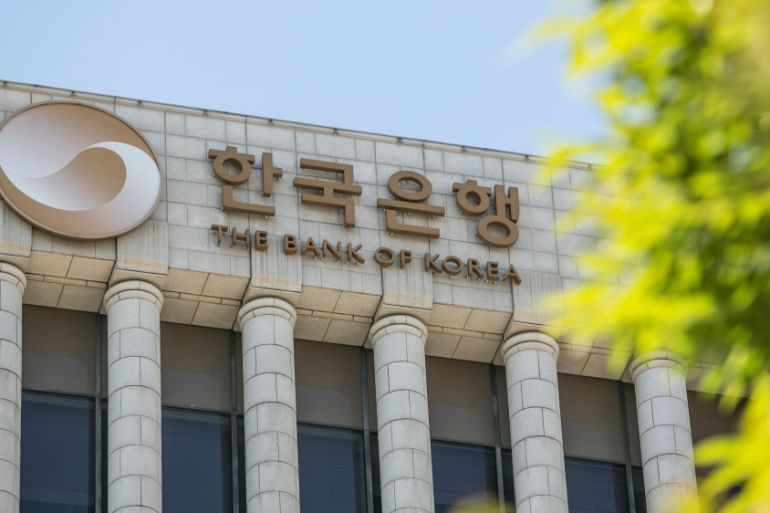Bank of Korea unleashes surprise rate cut as trade risks grow
Hurt by Japan’s export curbs and US-China trade war, Bank of Korea cuts interest rate to shield export-driven economy.

The Bank of Korea unexpectedly lowered its benchmark interest rate as the nation’s export slump drags on, joining a growing number of central banks acting to shore up cooling economies.
The BOK cut the seven-day repurchase rate to 1.5% from 1.75%, it said Thursday. The result was forecast by 10 of 25 analysts surveyed by Bloomberg.
Keep reading
list of 4 itemsChina’s economy beats expectations, growing 5.3 percent in first quarter
Inside the pressures facing Quebec’s billion-dollar maple syrup industry
Manipur’s BJP CM inflamed conflict: Assam Rifles report on India violence
Governor Lee Ju-yeol painted a gloomier picture of the economy, citing rising protectionism and frictions with Japan as the central bank lowered its growth and inflation forecasts. The BOK now expects the economy to grow 2.2% this year, versus 2.5% in April. Inflation is projected to rise 0.7%, versus 1.1% previously.
“The need to support economic recovery has become bigger,” he said in a news conference. “If Japan’s export restrictions against South Korea become a reality and even broaden, the impact on our economy, including exports, wouldn’t be small.”
The won reversed earlier losses against the dollar to appreciate 0.2%, while bonds rallied. South Korea’s benchmark Kospi stock index was down 0.3% as of 11:52 a.m. in Seoul.
Their first rate cut since 2016 reflects some urgency among BOK policy makers, who face growing pressure as the nation’s export-dependent economy slows and other central banks cut rates or signal they will soon.
Regional central banks from Australia to India have cut interest rates this year as global risks worsen. Bank Indonesia is expected to cut its benchmark rate by 25 basis points later on Thursday after six hikes last year.
“Bank of Korea’s rate cut reflects a broader policy easing wave across Asia,” said Chua Hak Bin, an economist at Maybank Kim Eng Research Pte in Singapore. “The tide has turned and more rate cuts are coming as growth slows. The U.S.-China trade war is disrupting tech supply chains and Korea is a key node in that chain. Japan’s export controls will worsen the disruption to tech supply chains.”
The U.S.-China trade war, China’s own economic slowdown and a slump in the semiconductor sector have sent Korean exports tumbling for seven straight months. Growing tensions with Japan have further dimmed the outlook.
The BOK raised rates in November, joining its Asian peers in pushing borrowing costs higher as the Federal Reserve’s rate-hike cycle pressured currencies and drew money out of the region. Eight months later, global monetary policy has shifted course as the trade war has dragged on.
BOK dilemma
Another factor in that November hike — which took the rate only a half percentage point above an all-time low — was record household debt and elevated property prices.
After the last policy meeting in late May, Governor Lee cited growing concerns about a prolonged trade war but said the central bank must also consider financial stability. He noted that household debt remained “very high” by any measure.
Still, there were signs a rate cut might be coming. Board member Cho Dong-chul dissented at the May meeting, saying the central bank should lower rates. Another board member said a cut was needed to address deteriorating economic conditions but should take place in July. The central bank didn’t name the second person.
Lee’s comment last month about “appropriately” responding to economic changes was also seen by some as signaling a cut.
Economic outlook
Lee has said the economy was recovering after an unexpected contraction during the first quarter from the previous three months.
The BOK forecast 2019 growth of 2.5% and inflation of 1.1% in April. Economists surveyed by Bloomberg see growth of 2.1%, the lowest since 2009.
Inflation remains far below the BOK’s 2% target, coming in below 1% for six consecutive months.
What Bloomberg’s economists say
“Looking forward though, the central bank has limited room for maneuver — the benchmark rate is now only 25 bps above its record low. That, paired with still-present concerns about financial imbalances, suggests the central bank will exercise extra caution before making any further moves.” –Justin Jimenez, Asian associate.